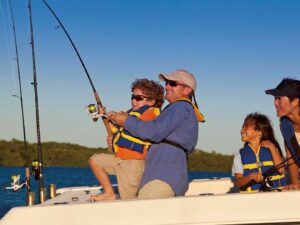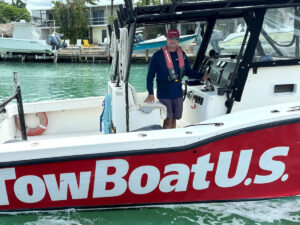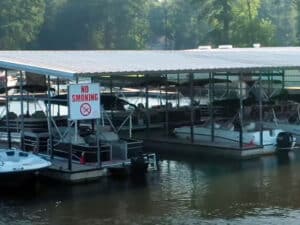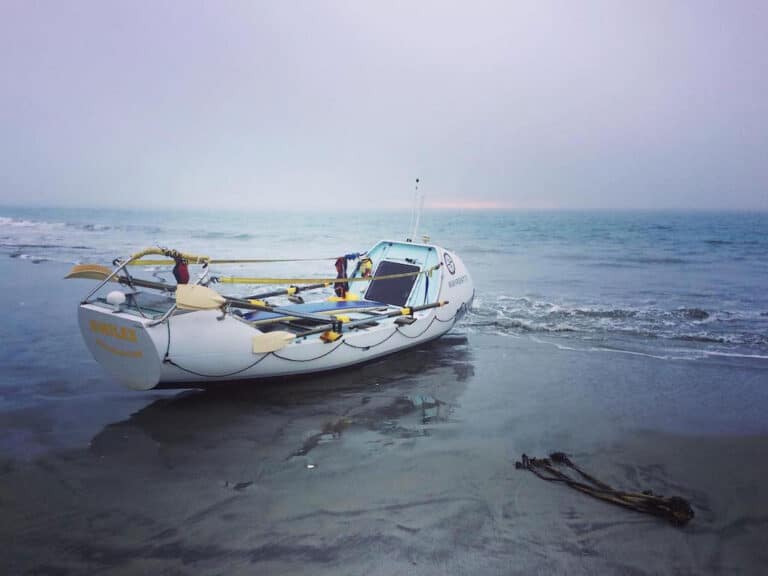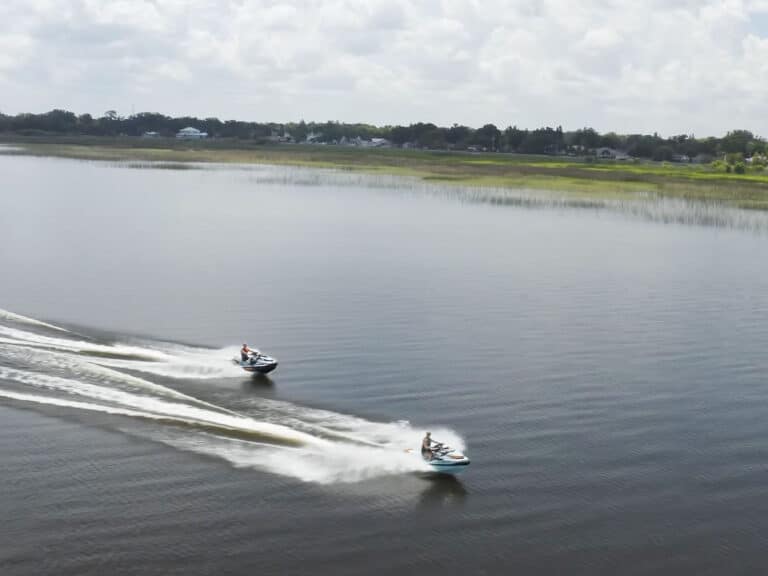Nothing quite compares to hunting waterfowl from a small boat. The rewards don’t come easy, what with pre-dawn launches and bone-numbing cold, but there’s something sublime about watching the sun come up over the water, with the mist rising through the reeds and an eager retriever between your boots.
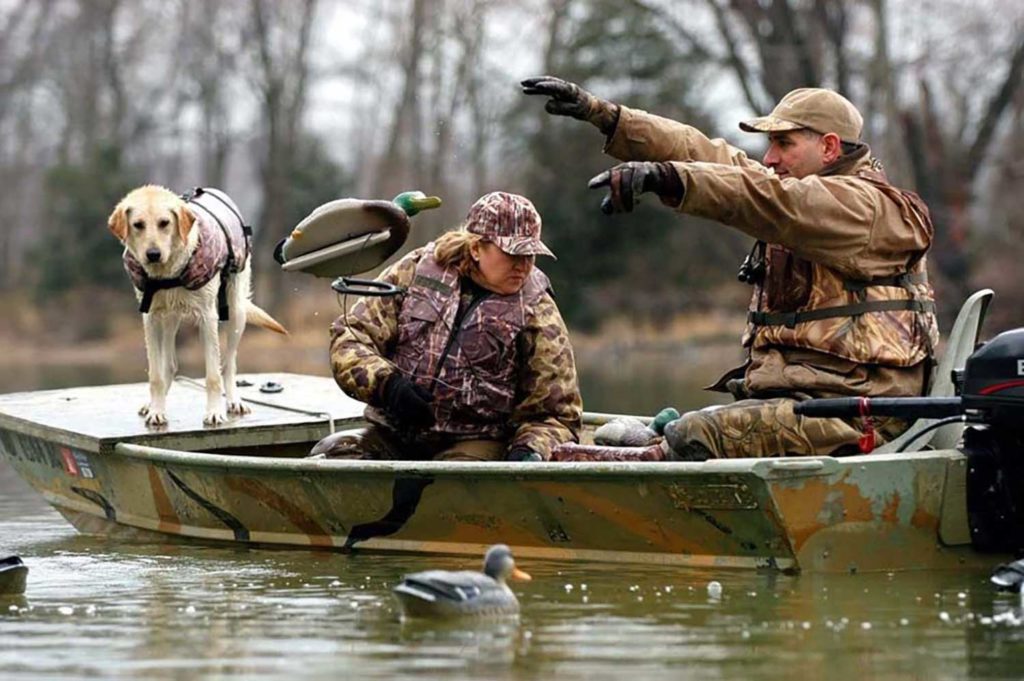
Truth be told, many waterfowl hunters come as much for those quiet moments as they do for their winged quarry. That peaceful mood can be deceiving, though. Hunting from a boat introduces a host of risk factors, from cold water and air temperatures to the hazards inherent in running a small craft in shallow water—and that’s before you add firearms, restless canines and foul weather to the mix.
“Duck-hunting is best when the wind’s blowing, so people really like to hunt the nasty weather,” says Paul Barnard, an avid duck hunter and former U.S. Coast Guard rescue coxswain who now heads up recreational boating safety for the sprawling Eighth District. Waterfowl seasons in most states open in November, which also happens to be the most dangerous month for boaters. While the busy summer months see more accidents overall, the rate of fatal accidents is much higher in November—25 percent in 2019.

“Falling overboard is the number-one kind of fatality in boating,” Barnard says. “If you’re wearing waders or boots and all those heavy clothes, and you fall into cold water that’s going to impair your function. You’ve really got a lot of elements stacking up against you.” Without a life jacket, such a dunking can quickly turn deadly.
Hunters favor small, flat-bottomed skiffs like Ranger’s MPV series or Lowe’s 18-foot Roughneck waterfowl boat—just the ticket for getting into the shallows and swampy thickets where waterfowl congregate, but statistically the most dangerous type of vessel on American waterways. Eight out of every ten boaters who drowned in 2019 were using vessels less than 21 feet in length. Open motorboats were the most common boat type involved in reported accidents (45 percent), and had the highest percentage of deaths (48 percent).
Now add cold water and night operation to the mix, and you see why the good folks at the U.S. Coast Guard and state wildlife agencies are so big on hunter safety. Luckily, a few simple precautions and the right gear can dramatically reduce the risk of your next hunt.

Wear Your Life Jacket
The first item on this list is easy: Wear your life jacket. Always. Many companies now make U.S. Coast Guard approved life jackets that are comfortable to wear all day and won’t inhibit your shooting.
Prepare for Cold Water
If you hunt waterfowl from a boat anywhere in North America, you’re going to be surrounded by dangerously cold water. Dress in synthetic insulating layers under a parka and windproof pants or waders.
Know Your Boat and its Limits
Remember that small, flat-bottom vessels are easier to capsize or swamp, and fill up quickly with blind material, decoy bags, guns and dogs. Take care not to overload your boat, and keep the weight low and evenly distributed. Shoot only from a seated position, and never when the boat is moving or the motor is running (it’s against the law in many states, and a bad idea everywhere). Finally, train your dog to lie in the middle of the boat like a good boy, until it’s time to go get that duck.

See and Be Seen
When you’re pushed up into the reeds waiting for birds, the goal is to be as close to invisible as you can. While traveling to your hunting spot however, you want to see and be seen. Make sure your duck boat is outfitted with proper running lights, and don’t let your guard down at daybreak—that pretty sunrise can make hazards such as low-lying stumps hard to spot. Keep your eyes peeled, and use an Engine Cut-Off Switch (also called a kill-switch) whenever the motor is running.
Plan For The Worst
Always leave a float plan with a loved one before your hunt, or whenever you go boating. If you don’t return by the specified time they’ll notify authorities. Check the weather before you go, and don’t rely solely on a cell phone for communications; small inexpensive satellite communicators can summon help from almost anywhere, and a hand-held VHF radio will allow you to communicate with rescuers if they ever have to come looking for you.
Most of the time, if you end up in the water your friends will be able to get you out. If that happens, you’ll need warm dry clothes right away. The late, great outdoor writer Wade Bourne recommended every hunter bring a full change of clothes—from underwear to parka—in a waterproof canoe bag. Add a lighter, a reflective emergency blanket, food and water to your go-bag, and then do everything you can to make sure you never need to use it.
The U.S. Coast Guard is asking all boat owners and operators to help reduce fatalities, injuries, property damage, and associated healthcare costs related to recreational boating accidents by taking personal responsibility for their own safety and the safety of their passengers. Essential steps include: wearing a life jacket at all times and requiring passengers to do the same; never boating under the influence (BUI); successfully completing a boating safety course; and getting a Vessel Safety Check (VSC) annually from local U.S. Coast Guard Auxiliary, United States Power Squadrons®, or your state boating agency’s Vessel Examiners. The U.S. Coast Guard reminds all boaters to “Boat Responsibly!” For more tips on boating safety, visit www.uscgboating.org.

